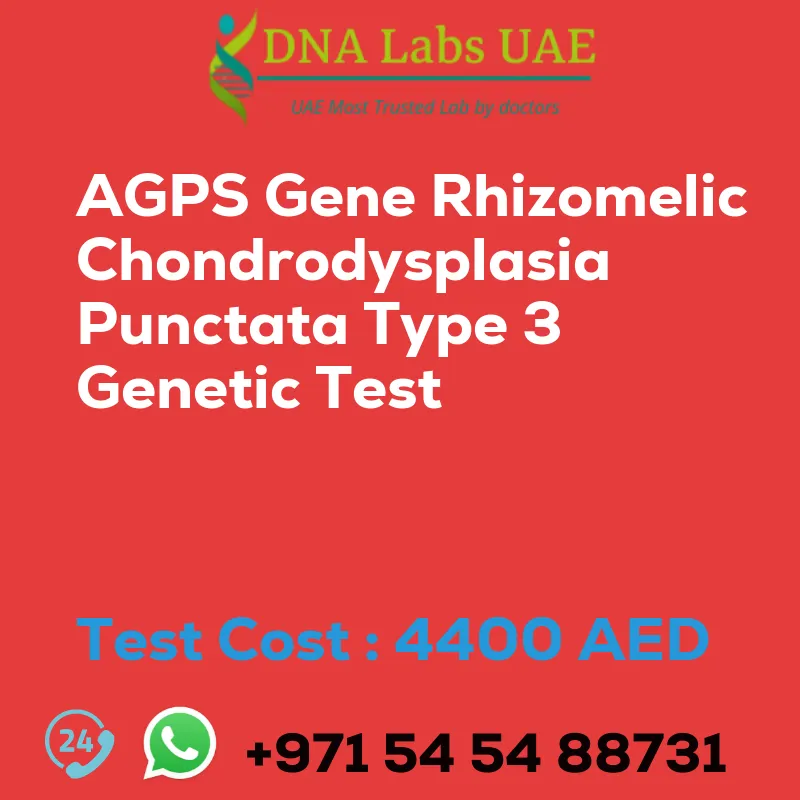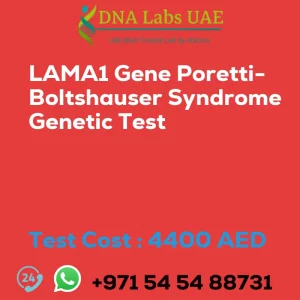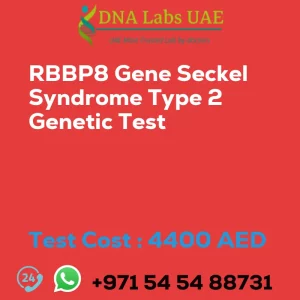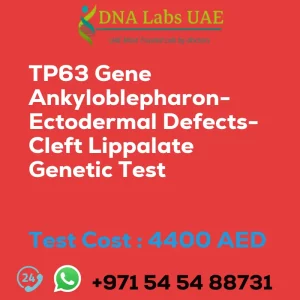AGPS Gene Rhizomelic chondrodysplasia punctata type 3 Genetic Test
Are you concerned about Rhizomelic chondrodysplasia punctata type 3 (RCDP3) and its genetic implications? DNA Labs UAE offers the AGPS Gene Rhizomelic chondrodysplasia punctata type 3 Genetic Test to provide valuable insights into this genetic condition.
Test Details
The AGPS gene (Alkylglycerone phosphate synthase) is associated with the genetic condition called rhizomelic chondrodysplasia punctata type 3 (RCDP3). This condition is characterized by skeletal abnormalities, growth retardation, intellectual disability, and characteristic facial features.
Our genetic testing technique, known as Next-Generation Sequencing (NGS), allows for the simultaneous analysis of multiple genes or even the entire genome. In the context of RCDP3, NGS can be used to analyze the AGPS gene for any disease-causing mutations or variants.
Test Components and Cost
- Test Name: AGPS Gene Rhizomelic chondrodysplasia punctata type 3 Genetic Test
- Price: 4400.0 AED
- Sample Condition: Blood
- Report Delivery: 3 to 4 Weeks
- Method: NGS Technology
- Test Type: Dysmorphology
- Doctor: Pediatrics
- Test Department: Genetics
Pre Test Information
Before undergoing the AGPS Gene Rhizomelic chondrodysplasia punctata type 3 Genetic Test, it is important to provide the clinical history of the patient. Additionally, a genetic counseling session will be conducted to draw a pedigree chart of family members affected with AGPS Gene Rhizomelic chondrodysplasia punctata type 3 NGS Genetic DNA Test gene AGPS.
Test Process
The NGS genetic test for AGPS gene analysis in RCDP3 involves obtaining a DNA sample, usually through a blood or saliva sample. The DNA is then sequenced using NGS technology, which generates a large amount of genetic data. This data is then analyzed to identify any mutations or variants in the AGPS gene that may be responsible for the development of RCDP3.
Test Results and Implications
The results of the NGS genetic test can provide valuable information about the presence or absence of disease-causing mutations in the AGPS gene. This information can help in confirming a diagnosis of RCDP3 and can also assist in genetic counseling and family planning.
It is important to note that genetic testing for RCDP3 or any other genetic condition should be performed by a qualified healthcare professional or genetic counselor. They can provide appropriate guidance and interpretation of the test results.
Conclusion
If you suspect the presence of Rhizomelic chondrodysplasia punctata type 3 (RCDP3) in your family, the AGPS Gene Rhizomelic chondrodysplasia punctata type 3 Genetic Test offered by DNA Labs UAE can provide crucial information for diagnosis and future planning. Contact our Genetics Department to schedule an appointment or for more information.
| Test Name | AGPS Gene Rhizomelic chondrodysplasia punctata type 3 Genetic Test |
|---|---|
| Components | |
| Price | 4400.0 AED |
| Sample Condition | Blood |
| Report Delivery | 3 to 4 Weeks |
| Method | NGS Technology |
| Test type | Dysmorphology |
| Doctor | Pediatrics |
| Test Department: | Genetics |
| Pre Test Information | Clinical History of Patient who is going for AGPS Gene Rhizomelic chondrodysplasia punctata type 3 NGS Genetic DNA Test. A Genetic Counselling session to draw a pedigree chart of family members affected with AGPS Gene Rhizomelic chondrodysplasia punctata type 3 NGS Genetic DNA Test gene AGPS |
| Test Details |
AGPS gene (Alkylglycerone phosphate synthase) is associated with the genetic condition called rhizomelic chondrodysplasia punctata type 3 (RCDP3). This condition is characterized by skeletal abnormalities, growth retardation, intellectual disability, and characteristic facial features. NGS (Next-Generation Sequencing) is a genetic testing technique that allows for the simultaneous analysis of multiple genes or even the entire genome. In the context of RCDP3, NGS can be used to analyze the AGPS gene for any disease-causing mutations or variants. The NGS genetic test for AGPS gene analysis in RCDP3 involves obtaining a DNA sample, usually through a blood or saliva sample. The DNA is then sequenced using NGS technology, which generates a large amount of genetic data. This data is then analyzed to identify any mutations or variants in the AGPS gene that may be responsible for the development of RCDP3. The results of the NGS genetic test can provide valuable information about the presence or absence of disease-causing mutations in the AGPS gene. This information can help in confirming a diagnosis of RCDP3 and can also assist in genetic counseling and family planning. It is important to note that genetic testing for RCDP3 or any other genetic condition should be performed by a qualified healthcare professional or genetic counselor. They can provide appropriate guidance and interpretation of the test results. |








